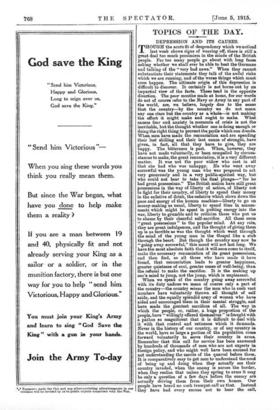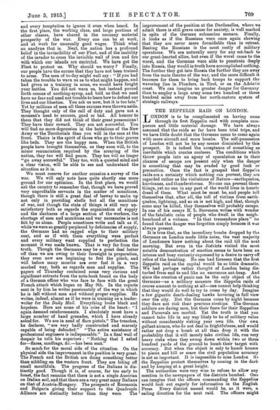TOPICS OF THE DAY.
DEPRESSION AND ITS CAUSES.
'THOUGH the acute fit of despondency which we noticed 1 last week shows signs of wearing off, there is still a great deal too much pessimism in the minds of the British people. Par too many people go about with long faces asking whether we shall ever be able to beat the Germans and talking of the "very bad news." When they cannot substantiate their statements they talk of the awful risks which we are running, and of the worse things which must soon happen. The ultimate origin of this depression is difficult to discover. It certainly is not borne out by an impartial view of the facts. These tend in the opposite direction. The poor mouths made at home, for our words do not of course refer to the Navy or Army in any part of the world, are, we believe, largely due to the sense that the conntry—by the country we do not mean any one class but the country as a whole—is not making the effort it might make and ought to make. What causes fear and anxiety in momenta of crisis is not the inevitable, but the thought whether one is doing enough or doing the right thing to prevent the peals which one dreads. When men have made the renunciation and. are spending their last shilling and their last ounce of strength, have given, in fact, all that they have to give, they are happy. The bitterness is past. When, however, they have not made voluntarily, or been compelled by circum- stances to make, the great renunciation, it is a very different matter. It was not the poor widow who cast in all that she had who was unhappy. He who went away sorrowful was the young man who was prepared to act very generously and in a very public-ajurited way, but who could not bear to take the final plunge—" for he had great possessions." The British nation have still great possessions in the way of liberty of action, of liberty not to fight for their country, of liberty to spend their money in the sedative of drink, the sedative which slows down the pace and energy of the human machine—liberty to go on money-making as usual, liberty to spend time in amuse- ments which might be spent in putting energy into the war, liberty to grumble and to criticize those who put us to shame by their cheerful self-sacrifice. All these seem "great possessions" to the popular mind. At any rate, they are great indulgences, and the thought of giving them up is as terrible as was the thought which went through the mind of the young man in the Gospel like a stab through the heart. But though the country may now be "going away sorrowful," this mood will not last long. We have the most absolute faith that it will sooncome to itself, make the necessary renunciation of its great possessions, and then find, as all those who have made it have found, that renunciation leads to greater happiness, greater quietness of soul, greater sense of well-being, than the refusal to make the sacrifice. It is the making up one's mind to jump, not the jump, which is unpleasant. When we speak of the country going away sorrowful with its duty undone we mean of course only a part of the country—the country "Mout the men who in such vast numbers have voluntarily thrown all thought of self aside, and the equally splendid army of women who have aided and encouraged them in their mental struggle, and have made the greatest saerificea of ail. The way in which the people, or, rather, a huge proportion of the people, have "willingly offered themselves" is fraught with a pathos so magnificent that it is difficult to deal with it with that control and reticence which it demands. Never in the history of our country, or of any country in the world, have so large a portion of the population come forward voluntarily to serve their country in arma. Remember that this call for service has been answered by hundreds of thousands of men who are not experts in foreign policy, and who might well have been excused for not understanding the merits of the quarrel before them. It is comparatively easy to get men to understand the need of being up and doing when they actually see their country invaded, when the enemy is across the border, when they realize that unless they spring to arms it may be only a question of a few days before the enemy are actually driving them from their own homes. Our people have heard no such trumpet-call as that. Instead. they have had every excuse not to hear the call, and every temptation to ignore it even when heard. In the first place, the working class, and large portions of other classes, have shared in the uncanny material prosperity of the war. Every one can be at work, and at work for unusually good wages. Think what an anodyne that is. Next, the nation has a profound belief in the invincibility of our Fleet, and of the inability of the invader to cross the invisible wall of iron and fire with which our islands are encircled. We have got the Fleet to protect us. Why should we worry ? Finally, our people have the excuse that they have not been trained to arms. The men of to-day might well say : "If you had taken the trouble to warn us as to what might happen, and had given us a training in arms, we would have fought your battles. You did not warn us, but instead poured forth oceans of soothing-syrup, and told us that we need have no fear and need not trouble to learn how to defend our lives and our liberties. You ask us now, but it is too late." Yet by millions of men all these excuses were thrown aside. They thought only of the call of duty and gave not a moment's heed to excuses, good or bad. All honour to them that they did not think of their great possessions ! They have their reward. They are not sorrowful. You will find no more depression in the battalions of the New Army or the Territorials than you will in the men at the front. Theirs is the spirit of those who go to their graves like beds. They are the happy men. When the British people have brought themselves, as they soon will, to the minor renunciation required by the arraying of the nation, they too will find peace. They too will no longer "go away sorrowful." They too, with a quieted mind and a clear vision, will be able to see and understand the situation as it is.
We must reserve for another occasion a survey of the war. We will only note here quite shortly one more ground for our optimism. In the first place, we would ask the country to remember that, though we have proved very unprofitable servants in the matter of munitions, though there is still a great deal of leeway to make up not only in providing shells but all the munitions of war, and though the state of things is still very un- satisfactory both as regards the organization of supply and the slackness of a large section of the workers, the shortage of men and munitions and war necessaries is not felt by us alone. People sometimes write and talk as if, while we were so greatly perplexed by deficiencies of supply, the Germans had no ragged edge to their military coat, and as if with them everything were perfect and every military want supplied to perfection the moment it was made known. That is very far from the truth. Though the Germans may be a great deal better off than we are owing to their foresight in preparation, they even now are beginning to feel the pinch, and will before many months are over feel it in a very marked way, both as regards men and supplies. The papers of Thursday contained some very curious and significant extracts from the note-book found on the body of a German officer who was face to face with the great French attack which began on May 9th. In the reports sent in by him he writes passionately of the way in which he is left without men and without proper supplies. He writes, indeed, almost as if he were in training as a leader- writer for the Daily Mail. Everything looks black and hopeless. Here are some of his cries of the heart "I again demand reinforcements. I absolutely must have a large number of hand grenades, which I have already asked for. We are in need of flare pistols." The trenches, he declares, "are very badly constructed and scarcely capable of being defended." " The active assistance of professional engineers is indispensable." In a final wail of despair he tells his superiors "Nothing that I asked for—flares, sandbags, &c.—luts been sent."
So much for the moral side of the situation. On the physical side the improvement in the position is very great. The French and the British are doing something better than nibbling on the western front. They are biting off small mouthfuls. The progress of the Italians is dis- tinctly good. Though it is, of course, far too early to boast, the fact remains that there is not a single Austrian on Italian soil, and that there are a very great many Italians on that of Austria-Hungary. The prospects of Roumania and Bulgaria giving their support to the Quadruple Alliance are distinctly better than they were. The improvement of the position at the Dardanelles, where we admit there is still grave cause for anxiety, is well marked in spite of the German submarine menace. Finally, it looks as if the Russians were once again showing that they are never more formidable than in retreat Beating the Russians is the most costly of military operations. We are naturally sorry for any set-back to our great-hearted allies, but even if the worst came to the worst, and the Germans were able to penetrate deeply into Russia, they would in truth have accomplished nothing. The further they get into Russia the further they are away from the main theatre of the war, and the more difficult it becomes for them to bring back troops to support tho wavering line in Flanders, in Tirol, or on the Adriatic coast. We can imagine no greater danger for Germany than to employ a large army some two hundred or three hundred miles away from her north-eastern system of strategic railways.



































 Previous page
Previous page